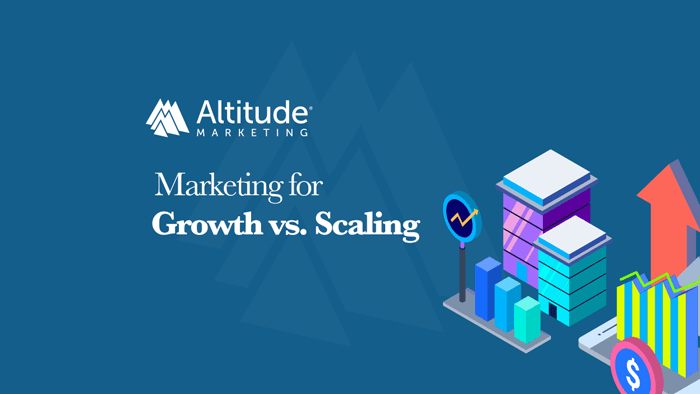It’s not uncommon for professionals to toss around “growth” and “scaling” interchangeably in conversation. News flash: They’re not the same thing. And marketing for a growth-focused company is totally different than marketing for a scale-focused company.
What makes them different, you ask?
Let us break it down for you.

Growth vs. Scaling: What’s the Difference?
A growth-focused company must increase expenses to increase revenue. This means that with growth, the relationship between revenue and expenses is basically linear. Ideally, you’d like to grow revenue more than expenses, but there will always be a relationship between the two.

This is most typical of professional services companies, where humans are conducting the bulk of the work. One employee can only ever support so much business, since they can only account for so many deliverables.
More People = More Expenses
Look, we’re not saying it’s impossible for these companies to scale, but escaping from that linear model is pretty darn difficult. Especially if they don’t have an endless flow of passive revenue streams to help them out.
When we talk about scaling, we’re primarily talking about software and technology companies.
These are the billion-dollar unicorns. Why?
Because they can multiply revenue without adding commensurate expenses.

It will cost a Google or Facebook some money to add users (a primary driver of revenue). But the relationship is far different than in a growth-focused company. Algorithms and AI can support tons more business than a human.
That, my friends, is a scaleable model.
In other words, “scaling” is not “growing fast” or “getting big.” It’s an entirely different type of business.
And there’s no value judgment here! A company that’s focused on growth isn’t worse than a company that’s focused on scaling.
Because scaling, unlike growth, involves a dramatic upfront investment.
We’re talking more dramatic than your-in-laws-at-Thanksgiving-dinner dramatic.
(Hard to believe, we know.)
Tech unicorns have typically poured hundreds of thousands or millions of investment dollars into their products. They’re fine with negative profits for years in search of mercurial future growth.
Imagine saying the same thing for an accounting or consulting firm – classic “growth” businesses. It would be insane.
The differences extend to how to market a company.
Marketing for Growth vs. Scale
For growth-focused companies, lead generation is important, sure. But there needs to be a focus on the right fit. A million leads that upset the apple cart don’t do anyone any good. There’s such a thing as bad money, after all.
They need to find the user base that’ll fit into their glass slipper.
They need to find their Cinderella.
Typically, this involves marketing at a specific vertical or horizontal. The tighter the niche, the better chance any given lead is a good fit.
A scale-focused company, meanwhile, can be a bit looser. It’s more important for them to find a fit in the market than a fit with clients.
After all, do you really care who’s using your SaaS product? As long as they’re not being jerks to your support team all day, it doesn’t really matter as long as their credit card stays valid.
Marketing for scale means marketing at scale. The chance for viral growth – and the ability to follow through – is a prerequisite for that billion-dollar valuation.
Be What You Are
You can’t have it both ways. As a marketer or a company executive, you need to have a clear stance on which type of company you are, what your expectations are, and why you’re doing what you’re doing.
If you pretend to be something you’re not, you’re going to replay the WeWork debacle of 2019. That was an obvious growth model that tried to scale.
Not great.
The more realistic your expectations, the better the outcome for your marketing – and your company.
Here’s the Big Picture.
You now know that growth and scale aren’t synonyms. They can’t be thrown haphazardly in place of each other in conversation.
One isn’t better than the other.
One isn’t a bigger version of the other.
Two different models; never the twain shall meet.
And marketing for growth vs. scale is a completely different ballgame, too.
Understand what your company is and what it’s capable of. Build your marketing strategy around that, and you’ll end up ahead of the game.



